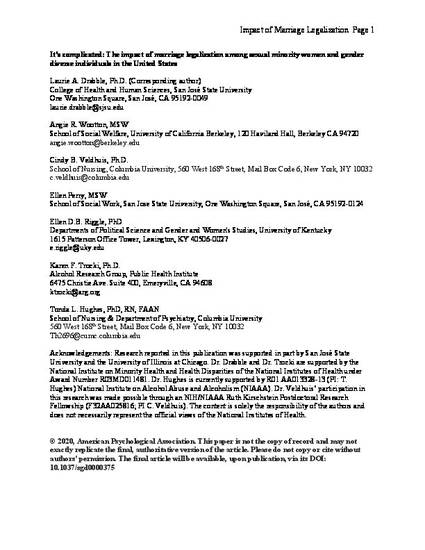
Article
It's complicated: The impact of marriage legalization among sexual minority women and gender diverse individuals in the United States
Psychology of Sexual Orientation and Gender Diversity
(2020)
Abstract
This mixed-methods study explored perceptions of the impact of marriage legalization in all U.S.
states among sexual minority women and gender diverse individuals. Survey data were collected
from a nonprobability sample of individuals 18 years or older who identified as lesbian, bisexual,
queer, same-sex attracted or something other than exclusively heterosexual—as well as
individuals who identified as transgender or gender nonbinary (for example, genderqueer, trans
woman, trans man, nonbinary, or gender non-conforming). The analytic sample included 418
participants in an online survey who responded to open-ended questions about the perceived
impact of marriage legalization. Qualitative analyses revealed perceptions of marriage
legalization that situated individual meanings in the context of broader political and social
factors. Four themes represented the complex perceptions of participants about marriage
legalization: 1) establishing a victory in civil rights, social inclusion, and acceptance; 2) creating
a paradox between positives of legalization and limitations of marriage as an institution; 3)
amplifying concerns for unaddressed safety and rights issues; and 4) contributing to the erosion
of queer identity and community. Quantitative analyses revealed several differences by
demographic characteristics, such as greater concern about the erosion of community among
unmarried participants compared to participants who were married. Findings underscore the
importance of policies that advance equality for sexual and gender minorities (SGMs), as well as
the importance of research exploring how policies are perceived by and impact SGM
subpopulations.
Abstract 2 – Short statement of Significance:
Legalization of marriage for same-sex couples in the United States was generally perceived by
sexual and gender minorities (SGM) as a civil rights victory and marker of increased social
inclusion and acceptance. At the same time, findings underscore remaining concerns such as
inconsistent policy protections against discrimination, structural stigma and stigma from family
and extended networks, and how centralizing marriage may undermine SGM community
connectedness and appreciation for diverse relationship structures.
Keywords
- sexual minority women,
- gender nonbinary,
- transgender,
- marriage legalization
Disciplines
Publication Date
2020
Publisher Statement
© 2020, American Psychological Association. This paper is not the copy of record and may not exactly replicate the final, authoritative version of the article. Please do not copy or cite without authors' permission. The final article will be available, upon publication, via its DOI: 10.1037/sgd0000375
Citation Information
Laurie A. Drabble, Angie R. Wootton, Cindy B. Veldhuis, Ellen Perry, et al.. "It's complicated: The impact of marriage legalization among sexual minority women and gender diverse individuals in the United States" Psychology of Sexual Orientation and Gender Diversity (2020) ISSN: 2329-0382 Available at: http://works.bepress.com/laurie_drabble/106/
